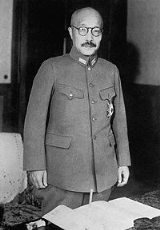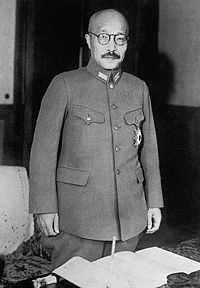
Preparatory Committee for Philippine Independence
Encyclopedia
The Preparatory Committee for Philippine Independence or the PCPI was the drafting body
of the 1943 Philippine Constitution which was signed and unanimously approved on September 4, 1943 by its members and was then ratified by a popular convention of the KALIBAPI
in Manila
on September 7, 1943.
 In mid-1942, Japanese Premier Hideki Tōjō
In mid-1942, Japanese Premier Hideki Tōjō
had promised the Filipinos "the honor of independence" which meant that the commission would be supplanted by a formal republic.
The PCPI was composed of 20 prominent Filipinos mostly pre-war legislators. But many Filipinos, ridiculed the PCPI's meaning, for them it was Please Cancel Philippine Independence
The PCPI tasked with drafting a new constitution was composed, in large part, of members of the prewar National Assembly and of individuals with experience as delegates to the convention that had drafted the 1935 Philippine Constitution. Their draft for the republic to be established under the Japanese Occupation, however, would be limited in duration, provide for indirect, instead of direct, legislative elections, and an even stronger executive branch.
Body
With regard to living things, a body is the physical body of an individual. "Body" often is used in connection with appearance, health issues and death...
of the 1943 Philippine Constitution which was signed and unanimously approved on September 4, 1943 by its members and was then ratified by a popular convention of the KALIBAPI
KALIBAPI
The Kapisanan ng Paglilingkod sa Bagong Pilipinas , or KALIBAPI, was a Filipino political party that served as the sole party of state during the Japanese occupation...
in Manila
Manila
Manila is the capital of the Philippines. It is one of the sixteen cities forming Metro Manila.Manila is located on the eastern shores of Manila Bay and is bordered by Navotas and Caloocan to the north, Quezon City to the northeast, San Juan and Mandaluyong to the east, Makati on the southeast,...
on September 7, 1943.
Background

Hideki Tōjō
Hideki Tōjō was a general of the Imperial Japanese Army , the leader of the Taisei Yokusankai, and the 40th Prime Minister of Japan during most of World War II, from 17 October 1941 to 22 July 1944...
had promised the Filipinos "the honor of independence" which meant that the commission would be supplanted by a formal republic.
The PCPI was composed of 20 prominent Filipinos mostly pre-war legislators. But many Filipinos, ridiculed the PCPI's meaning, for them it was Please Cancel Philippine Independence
The PCPI tasked with drafting a new constitution was composed, in large part, of members of the prewar National Assembly and of individuals with experience as delegates to the convention that had drafted the 1935 Philippine Constitution. Their draft for the republic to be established under the Japanese Occupation, however, would be limited in duration, provide for indirect, instead of direct, legislative elections, and an even stronger executive branch.
Other members
- Jorge B. VargasJorge B. VargasJorge B. Vargas was a lawyer and youth advocate born in Bago City, Negros Occidental, Philippines. He graduated valedictorian from Negros Occidental High School in 1909 and obtained a Bachelor of Arts degree in 1911 and a Bachelor of Law degree with honors in 1914, both from the University of the...
- Antonio de las Alas
- Claro M. RectoClaro M. RectoClaro Mayo Recto, Jr. , was a Filipino politician, jurist, poet and one of the foremost statesmen of his generation...
- Quintin ParedesQuintín ParedesQuintín B. Paredes was a Filipino lawyer, politician, and statesman.He was born in Bangued, Abra, Philippines in 1884 to Juan Felix Paredes and Regine Babila.-Education and early career:...
- Jose YuloJose YuloJosé Yulo was the Chief Justice of the Philippines during the Japanese Occupation and was Speaker of the Philippine House of Representatives from 1939 until the World War II started in 1941.-Career:...
- Vicente Madrigal
- Manuel RoxasManuel RoxasManuel Acuña Roxas was the first president of the independent Third Republic of the Philippines and fifth president overall. He served as president from the granting of independence in 1946 until his abrupt death in 1948...
- Sa Ramain (Alauya Alonto)
- Emiliano Tria Tirona
- Melecio Arranz
- Camilo OsiasCamilo OsíasCamilo Osías was a Filipino politician, twice for a short time President of the Senate of the Philippines....
- Rafael Alunan
- Pedro Sabido
- Teofilo Sison
- Manuel C. Briones
Drafting
| 1943 Constitution | |
| Drafting | July 9 to September 4, 1943 |
| Approval and Signing | September 4, 1943 |
| Ratification | September 7, 1943 |
See also
- Congress of the PhilippinesCongress of the PhilippinesThe Congress of the Philippines is the national legislature of the Republic of the Philippines. It is a bicameral body consisting of the Senate , and the House of Representatives although commonly in the Philippines the term congress refers to the latter.The Senate is composed of 24 senators half...
- Senate of the PhilippinesSenate of the PhilippinesThe Senate of the Philippines is the upper chamber of the bicameral legislature of the Philippines, the Congress of the Philippines...
- House of Representatives of the PhilippinesHouse of Representatives of the PhilippinesThe House of Representatives of the Philippines is the lower chamber of the...

